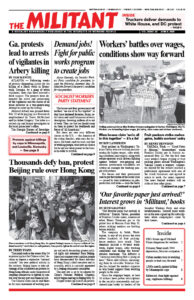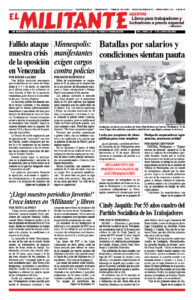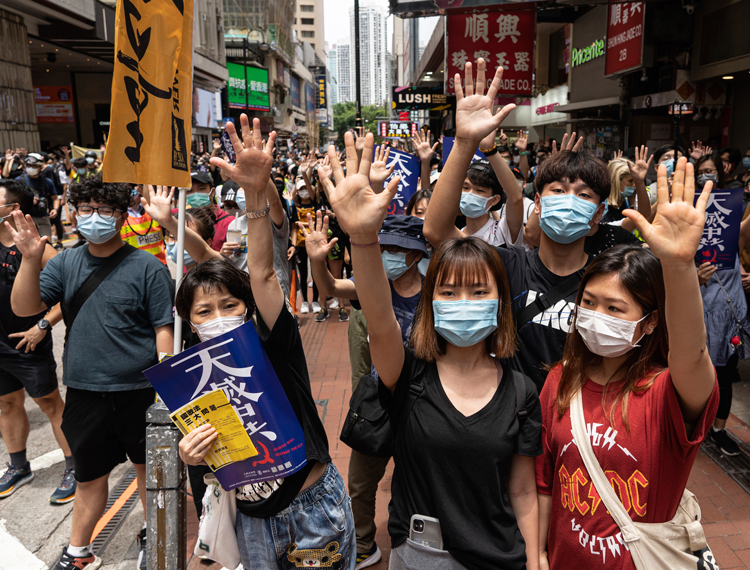Thousands took to the streets May 24 to protest against the Chinese rulers’ decision to impose a repressive “national security” law over political activity in the territory. Beijing hopes to take advantage of the crackdown on protests by Hong Kong officials under the pretext of stopping coronavirus to tighten its control over the key port and financial hub.
The Chinese rulers aim to deal blows to the mass movement of working people and youth demanding greater political rights and autonomy from Beijing. Since last summer over a million people have demonstrated for direct elections of Hong Kong’s chief executive and its assembly, which is currently appointed by a Beijing-dominated committee.
The new law is set to be adopted by China’s National Political Congress, which began meeting in Beijing May 22.
Despite brutal cop assaults on protesters and the arrest of thousands, the government’s efforts to subdue the movement have been futile. Earlier this month hundreds began to gather again in shopping malls to voice their opposition to Beijing’s restrictions.
The Chinese rulers’ new edict outlaws “treason, secession, sedition and subversion,” catch-all terms that allow them to go after political opponents. They falsely accuse those demanding greater freedom of being the tools of “foreign powers.” What they actually fear is that mass actions for political rights in Hong Kong will mean the loss of control over the territory and provide an example to working people on the Chinese mainland chafing under their dictatorial regime — something they are determined to prevent.
“We must stand up and fight, and let Beijing know that we will never surrender,” longstanding protest leader Joshua Wong told the press after he and thousands of others protested the new laws May 24. Cops used tear gas and water cannon to try to disperse the crowd. A popular slogan at the action was “Hong Kong independence, the only way out.”
Hong Kong Chief Executive Carrie Lam vowed her administration would loyally implement Beijing’s new law. The territory’s legislature also plans to make disrespect for the Chinese national anthem a crime punishable with jail time. Recent protests have featured participants booing Beijing’s anthem and singing one they have written — “Glory to Hong Kong” — which includes the line, “Arise! Ye who would not be slaves again: for Hong Kong, may freedom reign!”
Lam’s cops stormed into a meeting of the legislature May 22 and arrested members who were protesting the new attack on free speech.
Under the 1997 agreement ending British colonial rule in Hong Kong, its assembly was required to enact explicit “security” measures. But legislators shied away from doing so after a demonstration of half a million in 2003 forced them to withdraw proposals similar to those Beijing is imposing today.
China’s foreign commissioner in Hong Kong, Xie Feng, claimed the measure would “alleviate the grave concerns among local and foreign business communities about the violent and terrorist forces” in the demonstrations.
More protests took place May 27 when the Hong Kong legislature debated the new law criminalizing disrespect of the Chinese anthem.
City authorities decreed that gatherings of more then eight people would continue to be banned until at least June 4, the anniversary of Beijing’s bloody repression of Tiananmen Square protests.
Washington threatens reprisals
Secretary of State Mike Pompeo seized on Beijing’s imposition of the new law to press forward the U.S. rulers’ interests in their conflicts with Beijing. He threatened Washington would withdraw Hong Kong’s preferential trading status, which would raise tariffs on goods exported from Hong Kong to the U.S.
With the steep drop in capitalist production and trade worldwide, conflicts between Washington and Beijing have sharpened. President Donald Trump has heaped condemnation on the Chinese government, saying its cover-up of the extent of coronavirus in China last fall hastened the spread of the disease.
The accelerating economic crisis is also provoking new conflicts between Beijing and governments across Asia that are indebted to the Chinese government for substantial loans. These credit lines were aimed at facilitating Beijing getting contracts for infrastructure projects that will advance the Chinese rulers expanding their markets and domination in the region.
In recent weeks Beijing received requests from governments of Pakistan, Kyrgyzstan, Sri Lanka and elsewhere to delay upcoming loan repayment deadlines. It presses governments desperate for loans to put up their country’s patrimony as collateral. Beijing seized a port in Sri Lanka when the government there struggled to make loan repayments in 2017.


